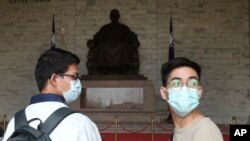Taiwan sits near Japan, China and South Korea, three countries with some of the world’s worst outbreaks of the deadly coronavirus, but the island itself has just 42 isolated cases.
Chalk it up to extra early, effective preparedness, analysts and policymakers say – so effective that people’s approval of the government unexpectedly soared last month.
Taiwanese health officials saw the virus taking shape in the central Chinese Wuhan in December and began checking passengers who flew in from there. They also cut off flights from much of China, the outbreak origin, before a lot of peers around Asia did.
Now almost every public building in Taipei offers hand sanitizer and a lot of them, such as schools, require that anyone entering submit to a fever check. Taiwan's Centers for Disease Control announces any new cases every day. In February it began rationing facemask purchases to head off panic buying.
“With the hit from Wuhan pneumonia, most people originally figured Taiwan was going to be miserable this time because of ties with mainland China are so close, and that it couldn’t be avoided,” said You Ying-lung, chairman of the Taiwanese Public Opinion Foundation polling agency, using a local term for the disease officially dubbed COVID-19.
“But as the things became clear, it turned out Taiwan wasn’t so miserable and in fact compared to other countries in the world, it’s got the best performance,” he said.
The government first took notice of the virus in December as people in China began talking about it informally. In response, the Centers for Disease Control started onboard quarantine of all direct flights from Wuhan on December 31. The centers said on its website that by January 9 it had “inspected” 14 flights with 1,317 passengers and attendants.
The disease caught the attention of other countries in late January. Although numbers of new cases are dropping in China, Japan and South Korea are grappling with recent outbreaks.
Officials in Taiwan took a “more proactive” approach compared to other parts of Asia by stopping flights from China, lawmaker Lo Chih-cheng said. Hundreds of thousands of Taiwanese live in China and a lot of them return in the first two months of each year for holidays, a pattern that increased Taiwan’s exposure to the disease.
The Centers for Disease Control's daily announcements include details on how new patients might have gotten sick and whether anyone else might be infected. The island’s only death, for example, was described as a taxi driver in his 60s with two existing medical conditions.
Taiwanese citizens, Lo said, consider transparency “very important.” The government hopes to release information that keeps people on guard without inciting any panic, analysts believe.
Taiwan’s public schools resumed classes just two weeks later than scheduled after a break in February, unlike the situation in Hong Kong and Japan where caseloads are higher.
Taiwan moved fast because of its experience 17 years ago with SARS, or severe acute respiratory syndrome. That disease originated in China and jumped into other parts of Asia. It killed 73 people in Taiwan.
Officials are looking for ways now to minimize economic impacts of the virus.
Tourism revenue slumped in February because of lack of flights and fear among Taiwanese of going abroad, travel agents have said. Local event cancellations intended to stop any virus spread are hurting swathes of the service industry as well.
In Taiwan’s signature manufacturing sector, companies with China plants face slowed production if their workers are still staying home to avoid catching the virus.
“The ultimate impact of course includes that Taiwan’s GDP growth will definitely go down, because Taiwan’s GDP is very connected to China’s economy,” said Huang Kwei-bo, vice dean of the international affairs college at National Chengchi University in Taipei.
Parliament approved a $1.96 billion stimulus package last month for companies shaken by the outbreak. After the virus subsides, Lo said, the government will come out with discount vouchers to encourage spending. More might be in the pipeline.
“We need to do something to help the small and medium-sized enterprises to pass through this kind of difficult period,” Lo said. “The government for example needs to lower the interest rates and to help the people or the companies, or factories, to borrow new loans from the bank, so this is the first stage.”
Action against the coronavirus to date has boosted President Tsai Ing-wen’s approval rating to 68.5% in February up from 56.7% in January and on par with what she polled right after taking office in 2016, a Taiwanese Public Opinion Foundation poll showed February 24. Local television network TVBS gave the government an 82% approval rating for its handling of the outbreak.
“The meaning is the Tsai government is doing pretty well,” You said.





